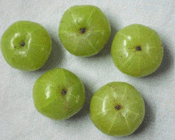Gooseberries (R. uva-crispa L.) are one of many 4 wild Ribes species (R. alpinum L., R. rubrum L. and R. petraeum Wulf.) rising within the Northern Hemisphere. As in currants, gooseberry additionally grows greatest in areas the place summers are humid, however winter is extreme and chilling.
| Amla-Indian gooseberries (Phyllanthus emblica). |
| Cape gooseberry (Physalis peruviana). |
Gooseberry plant is a fast-growing, small deciduous shrub rising about 4-6 ft in peak, that includes sharp thorns all alongside its woody branches. The plant begins fruiting 2-3 years after plantation. Berries are available many shapes, colours, and tastes. They are often spherical, oval, pear-shaped or elongated, inexperienced, white, yellow, purple, red-brown or black shade, candy and tart. Their outer floor will be easy or fuzzy (furry) with conspicuous veins. Inside, a berry could maintain 15-30 tiny edible seeds. Normally, the berries measure 1-2 cm in width and weigh about 4 g to 10 g.
Indian gooseberries, also referred to as amla within the subcontinent, belongs to a special household of Euphorbiaceae. Their scientific identify is Phyllanthus emblica. Indian gooseberry encompasses a transversely spherical form with a lightweight inexperienced shade. Amla berries are exceptionally excessive in antioxidants and vitamin C. For a similar motive; they’re excessively acidic and bitter (astringent) in style.
Cape gooseberry (Physalis peruviana), also referred to as Peruvian cherry within the US, is native to the South American Andes area.
The berries are small, spherical, orange-yellow in shade, encased inside a Chinese language lantern-like papery skinny husk.

